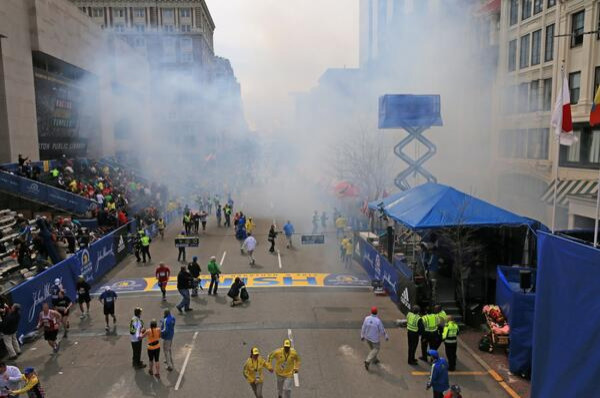Boston Marathon Bombings, 9/11 And The Media: Two Domestic Terrorist Attacks, Two Very Different Models

Overreaching declarations about new paradigms seem to come along all too often these days, but Monday’s bombings at the Boston Marathon indicate that we’ve indeed crossed the threshold into a post-media media model. To see how much the world has been turned on its head in terms of the dissemination of information, we only need refer to another act of domestic terrorism, one that took place just 12 short years ago.
The Sept. 11, 2001, attacks on New York’s World Trade Center are often cited as the most photographed events in history, but if the bombings in Boston are any indication, it’s only a matter of time before 9/11 loses that title. In 2001, the U.S. had only 110,000 cellphone subscribers, and many of those phones barely had texting abilities, let alone cameras and Web-readiness. Today, according to the Pew Research Center, about one-half of Americans own smartphones, and almost 70 percent of Internet users use social media. Depending on how you add up the numbers, that’s at least 130,000 potential citizen journalists who were present during the marathon, ready and able to post breaking news of the devastation as it was happening.
For people who had heard about Boston in the ensuing minutes (read: almost everyone in the Western world with the exception of Simon Pegg), there was no need to speculate. We could see graphic images of the bombings, read first-hand horror stories from people on the front lines, check our Twitter streams for death tolls. Forget second-day news analysis. If we were so inclined, we could read an introspective think piece from the Washington Post’s Erik Wemple less than two hours after the bombs went off, waxing philosophical about the role of social media in modern-day catastrophes.
It seems downright antiquated now, but news of the 9/11 attacks spread to the world from the inside out, in a series of concentric circles proffered by traditional watchdogs and news gatherers. Seconds after the first WTC tower was struck, first responders were dispatched, and local television and radio reports followed. By the time CNN interrupted a Ditech commercial for a breaking-news report, three long minutes had passed, as shown by this video on YouTube. It took another few minutes for online bulletins to appear on websites, and for BBC to fill in the rest of the world.
In contrast, information on the Boston Marathon bombings rained down in a diffuse blanket, fueled by scattershot connections on social networks and message boards. Twitter, Reddit, Facebook, 4chan -- they all knew what was happening, or at least that something had happened. Big Media, at its best, played catch-up. As BuzzFeed’s John Herrman and Ben Smith pointed out on Thursday, the role of traditional journalist switched from reporting information to sorting it out.
Then, as the literal smoke cleared on Boylston Street, we prepared for the inevitable misinformation from the very sources we turn to when we need to filter the noise -- and the trigger-happy media, for their part, did not disappoint. CNN’s John King stumbled and stammered through a false report about a possible suspect, only to be slapped down by the Boston Police Department and the FBI. And the New York Post, ever the poster child for dead-tree-era irresponsibility, erroneously reported that 12 people died in the blasts, as noted by the Washington Post, and that a Saudi national was “a suspect in the bombing,” as pointed out by Talking Points Memo. Then, to add insult to injury, it plastered its front page with an incriminating photo of two marathon bystanders, unconnected to the bombing, whom it identified as “Bag Men,” as documented by Salon.
None of this went unnoticed, of course. Both CNN and King enjoyed the dubious honor of trending-topic status as King backtracked from his report. As for the Post, let’s just say it’s earned more than its share of condemnation, both from media insiders and anyone with a modicum of decency. On Twitter, Salon called its front page a “new low” (since its last one?), while a Time magazine columnist blasted it as “appalling.” Indeed, one wonders if the Boston Marathon bombings represent a tipping point at which reporting about an event has been surpassed by reporting about reporting about an event. If that last sentence made you dizzy, you’re not alone. New paradigms tend to have that effect.
Got a news tip? Send me an email. Follow me on Twitter: @christopherzara
© Copyright IBTimes 2024. All rights reserved.






















